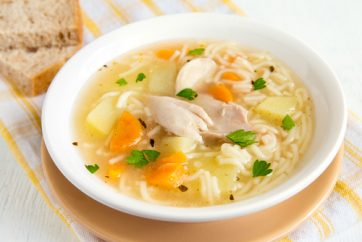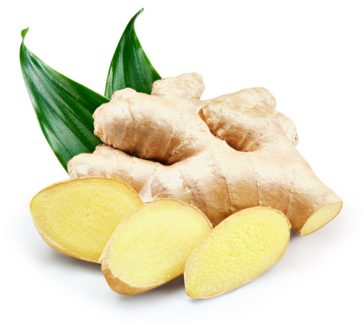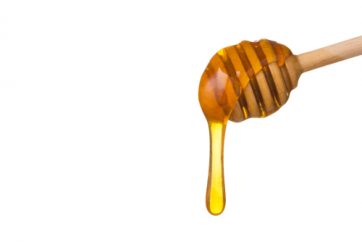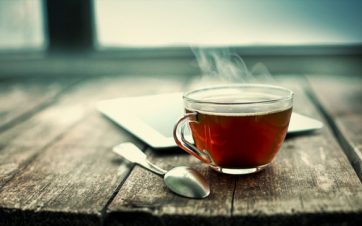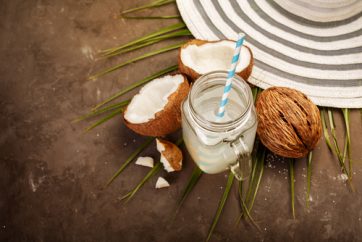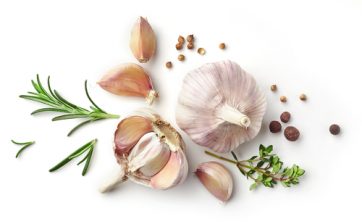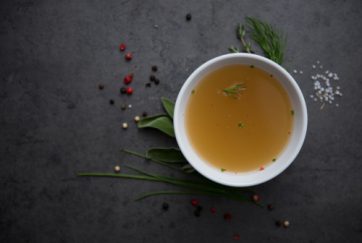Being sick is not fun, time seems to slow down, and you can’t help but count the days- which seem like weeks- until you get better. To help you with the latter aspect, we break it down for you as we highlight what to eat when sick and what not to eat when you’re sick. This article will explain a few foods that you should eat when you are sick and those that you need to avoid.

What to Eat When You are Sick – Best Foods
Caveat. These foods are just listed in general form. You should ask your doctor about the foods that you need to eat and those you need to avoid based on your illness.
Let’s start with those healing foods that dieticians and moms around the world have given the green light of approval for what to eat when you are sick:
1) Chicken soup
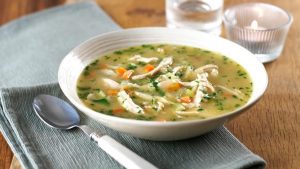
Chicken soup is the number 1 food of what to eat when you are sick! You certainly saw this one coming. A soup that has become a household name and the general rule of thumb for parents nursing their sick children for decades. There are a few reasons why chicken soup is recommended when you are sick. It has desirable electrolytes, which are used to control your fluid balance. They are used to help muscles contract and to maintain the correct acidity to your body.
It also has healthy fluids, proteins, minerals, vitamins, and calories. In addition, chicken soup helps to control your blood pressure and to power your bones. Therefore, when you are sick and don’t have appetite to eat, chicken soup will provide you with the much needed nutrients that will power your body.
Chicken soup is an easy-to make recipe. One way you can prepare it is to heat onions and cooking oil, and then add tomatoes. After a few minutes, you should add the sliced chicken pieces, some water, some flavours and then let it boil. The soup will be done within a few minutes.
2) Broth
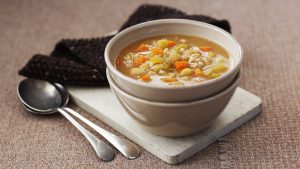
If chicken is not among your preferences, then broth is the next best thing. It avails a plethora of essential minerals and nutrients while, more importantly, providing the right amount of fluids to battle dehydration.
There are other benefits of drinking broth soup. While it is not a drug, broth will help you alleviate common cold and bronchitis. This was revealed by a study published in the American College of Chest Physicians in 2000. It does this by helping clear the mucus, opening the respiratory pathway, and by providing food that is easy to digest.
Broth also helps to fight inflammation because of the many amino acids that are in it. Examples of these acids are cystine, histidine, and glycine. It also helps to strengthen bones and teeth because of the calcium nutrients that it has. Further, if you have some weight issues, research has revealed that broth can help you lose some weight.
Bone broth is also essential in improving the body hydration. This is the case when some vegetables are added into it. It also helps to build body muscle. It is also loaded with gelatin, which helps you sleep better and improve your skin.
While you can buy ready-made broth at a local grocery store, you can also prepare it at home. The process is relatively easy. First, you need to have some meat. Chicken and beef are recommended. For best results, you should use knuckles, joints, feet, and marrow bones. You should then roast the meat, which will give it some good flavor. After this, move the bones to a stockpot and boil them. Next, simmer the bones for at least 10 hours and strain them.
3) Garlic
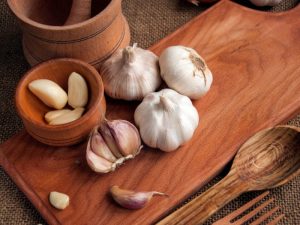
The uses of garlic extend beyond vanquishing vampires in movies, with it substantiated to give a failing immune system that extra push it needs to get going. Garlic is highly desirable for its anti-fungal, antiviral, and antibacterial capabilities.
Garlic has a number of benefits for your body and that is why experts recommend that you should eat it when sick. If you have a cold, a concoction of garlic and lemon is known to be an ideal product for easing the discomfort. In addition, garlic has some active compounds that can help reduce blood pressure.
Garlic is also known to help improve cholesterol levels in the body. For people with high levels of cholesterol, garlic can help reduce the total cholesterol count by 10%. This is mostly the case for people with the LDL type of cholesterol.
Another unknown fact about garlic is that it has antioxidants that can help reduce or prevent Alzheimer’s disease and dementia. Further, if you are an athlete, studies show that your performance might be improved by eating garlic and garlic supplements. It might also help you to detoxify your body from heavy metals.
To prepare garlic, it is recommended that you peel it, boil it in hot water, and then add some other ingredients like pure honey and lemon.
4) Coconut water
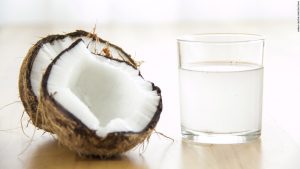
As you’ve probably noticed by now, keeping hydrated is an integral part of recovery. Coconut water provides yet another bountiful composition of electrolytic fluids to offset the effects of diarrhea, vomiting, sweating, and fevers. It’s also easy on the taste buds as well.
Coconut water is an essential drink you might want to eat when sick for a number of reasons. First, coconut water has a number of nutrients. A cup of coconut water has 9 grams of carbohydrates, 3 grams of fiber, 2 grams of protein and calcium. Other nutrients in a cup of coconut water are manganese, potassium, sodium and vitamin C.
There are number of reasons why you may want to drink coconut water when sick. It is known to have some antioxidant properties. This helps to improve metabolism. It also has benefits against diabetes because it helps to lower blood sugar levels. It might also help to prevent kidney stones and other heart health issues.
You can buy coconut oil from a grocery store. Alternatively, you can buy a coconut, drain the coconut water and put it in a cup. Then, blend the coconut and mix it with water and drink it.
5) Hot tea
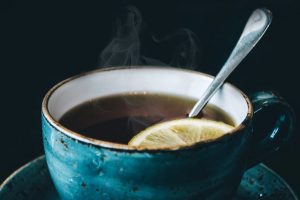
Hot tea burns you a path to restoration by easing decongestion in a similar way to how chicken soup works. Additionally, tea has compounds such as polyphenols which are thought to have anti-cancer, anti-inflammation, and antioxidation benefits.
There are a number of benefits you gain by drinking hot tea. Tea has antioxidants, that help to rejuvenate the body. Further, tea has less caffeine than coffee. According to research, coffee has 50% caffeine less than that of coffee. In addition, tea can help you reduce the risk of heart attack and stroke. It can also help you protect your bones and boost your immune system.
The process of preparing tea is relatively simple. Just boil some water, add a tea bag, and some sugar and the tea is ready.
6) Honey
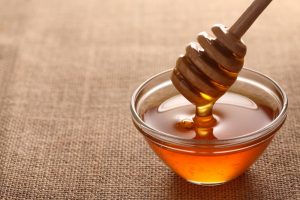
Fewer things are sweeter than honey, which is especially useful when your throat is flaring up from a cold. Honey is believed to not only catalyze the action of the immune system to fight back against whatever is keeping you down but also has strong antibacterial traits.
There are a number of reasons why honey is an important product. First, it contains several nutrients. For example, a tablespoon of honey has 64 calories and 17 grams of sugar. These sugars are glucose, maltose, and sucrose. Honey is also rich in antioxidants like organic acids and flavonoids. If you have diabetes, honey is better than sugar. Finally, if you have a cold, a concoction of honey, lemon, and ginger can help you get better.
7) Ginger
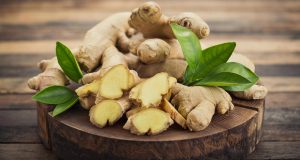
If you’re occasionally feeling dizzy accompanied by a constant urge to vomit, ginger can put a lid on that bottle. Aside from alleviating nausea, its antioxidation and anti-inflammatory properties ensure it holds many more benefits beyond that. Probably my favourite and also what a recommend to all my clients. Ginger contains a number of nutrients like iron, potassium, Vitamin C, zinc, and iron.
Other than these benefits, ginger is known for a number of reasons. Ginger helps to stimulate digestion. It helps in this by reducing the so-called functional dyspepsia. It also helps to increase the body’s ability to empty food from the stomach more quickly. It also helps to lower the blood pressure, reduce nausea, reduce inflammation, helps to regulate blood sugar, and reduce menstrual pains.
8) Spicy foods
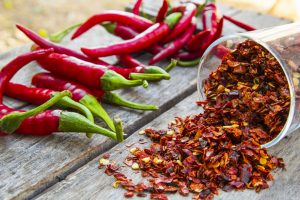
When flu comes knocking, it’s time to turn up the heat quite literally. Any food that instigates a burning sensation upon contact is considered as spicy, and that entails chilli peppers and any fruit or vegetable with capsaicin constituents. Capsaicin eases itching and congestion.
In addition, spicy foods can help you enjoy the meal when you are sick. As you know, eating more food when sick can help you get better.
9) Bananas
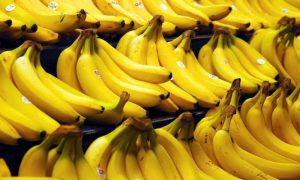
Bananas have soluble fibre that counters symptoms such as diarrhoea while also providing a generous amount of nutrients and calories. They are also easy to chew and work wonders for persistent nausea. Bananas are some of the most popular fruits in the world. They are known to have a number of essential nutrients such as potassium, vitamin C, copper, manganese, fiber, protein, and fat. Each banana has about 105 calories.
When sick, most people don’t have appetite. Therefore, eating a banana can help keep you going when you are not eating. In addition, bananas have nutrients that moderate blood sugar levels and help to improve digestion. They can also help you reduce some weight. They also have powerful antioxidants.
10) Oatmeal
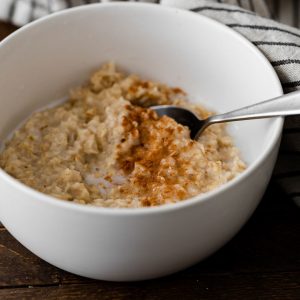
Much like its predecessor on this list, cereal isn’t strenuous on the tongue. Besides that, it holds a significant amount of proteins and can circumvent boating, cramping, and diarrhoea. Be sure to stick with oatmeal free of added sugar. Oats contain a number of nutrients like manganese, phosphorous, copper, iron, zinc, and folate.
When sick, oatmeal is rich with antioxidants that help dilate blood vessels and lead to better blood flow. They also contain a powerful soluble fiber called beta-glutan, which helps to reduce LDL and total cholesterol levels and reduce blood sugar.
What Not to Eat When You’re Sick
When you are sick, there are a number of things that you are not supposed to eat and drink. This is because these foods and drinks could have a negative implication to the body. They could also make your health condition deteriorate. Here are some of the most common things you should always avoid when you are unwell.
1) Refined sugar
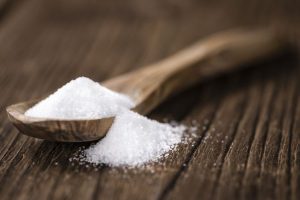
When your body is not entirely up to speed, such kinds of sugars only lengthen the recovery period. Refined sugar can alter the effectiveness of your body’s immune system slowing down the functioning of white blood cells. What’s more, it can also trigger bodily inflammation. So, popsicles and ice creams, which have loads of the compound, are therefore out of the question for the time being.
When sick, you should try and avoid sugar for a number of reasons. Sugar can lead to cause weight gain, which is not ideal. It can also increase your risk of heart disease, acne, diabetes, cancer, accelerate the skin aging process.
Reducing the amount of sugar intake is not easy because most products you use have sugar in them. Some of the sugary things you should avoid are drinks like soda, sugar-loaded desserts, sauces with a lot of sugar, and canned products. You can substitute sugar with things like plain yogurt, healthy snacks, taking tea or coffee without sugar.
2) Alcohol

Alcohol has some health benefits when used moderately. It helps to reduce the risk of heart disease. It aids in digestion, and helps reduce the risk of diabetes. However, when you are sick, you should avoid taking alcohol.
Alcohol is at the top of the blacklist regardless of the illness you have. Its ability to trigger massive dehydration makes it particularly unsuitable for those with the chills. There are a number of reasons why you might want to avoid alcohol when you are sick.
First, you don’t want to deal with a hangover when you are sick. Second, alcohol interferes with many drugs that you might be taking. Third, it can increase the chances of other illnesses like heart disease, stroke, heart failure, and high blood pressure. Other problems are that it affects the immune and digestive systems. Further, excessive alcohol can lead to pancreatitis, sudden death if you have cardiovascular disease, liver disease, and alcohol withdrawal syndrome.
3) Acidic foods

There are a number of foods that are known for their acidity. These include fruits like lemon, grapefruits, apples, blueberries, and limes among others. When you are sick, it is recommended that you should avoid these foods because they can have a negative reaction with the drugs that you are taking. Other implications are having liver and heart diseases, bone and muscle deterioration.
4) Canned soup and saltines

Often a go-to for the sick, you should be steering clear of canned soups because of their usually high sodium concentration. In the same breath, say no to saltine crackers whose abundance of soybean oil and fructose corn syrup doesn’t bode well for a sickly body.
5) Junk food
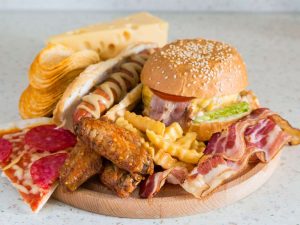
Forget the burgers, the fries, and whatever else that makes up greasy junk food. These foods are rich in pro-inflammatory fats, which means that they can worsen any inflammations you already have, leading to significant discomfort. They are also leading causes of weight gain. Other reasons why junk food are bad for you are that they lead to fatigue, can lead to depression, problems with digestion, fluctuations of blood sugar levels, kidney disease, and can damage your liver. Instead of junk food, you should replace it with more traditional foods such as those mentioned above. Some of the most popular junk food to avoid are French flies, pizzas, sodas, energy drinks, white bread, and sweetened cereals.
6) Toast
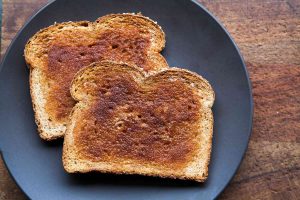
Watch the toast, French or otherwise. It’s undoubtedly a quick remedy for an unsettled stomach, but its coarse texture isn’t too kind on a sore throat. Generally, avoid anything with a scratchy and dry exterior as these can increase throat irritation. Toast bread contains wheat and a lot of fat, which is not ideal. According to studies, toasting bread has a chemical known as acrylamide. According to the World Trade Organization (WTO), while studies on acrylamide are incomplete, people should avoid them to minimize the impacts of cancer. Further, bread contains wheat, which is known to have gluten. Gluten has its own risks, which include cancer, bloating, diarrhea, liver problems, and weight problems.
7) Dairy
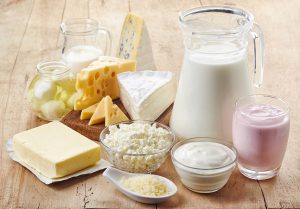
Dairy products like milk, ice cream, butter, cheese, and frozen desserts are so popular with people. Indeed most, dairy products have many benefits. For example, milk helps in bone development. It also helps in appetite control, dental health, diabetes protection, and heart health.
However, depending on where you are sick, nutritionists recommend that you avoid some dairy products. This is because these products are known to lead to acne and other skin diseases. It also leads to bone fractures, allergies, cancers, and lactose intolerance. Other dairy products like cheese are known to have high fat concentrates. Other dairy products are known to have a lot of preservatives. These artificial preservatives are usually not good for you. You can substitute milk with the likes of soy milk, almond milk, coconut milk, and hemp milk.
8) Sports drinks
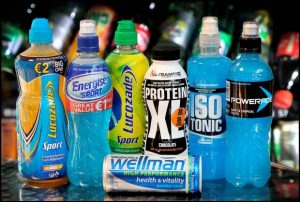
It’s a common belief that sports drinks are a great way to manage as they replenish dwindling electrolytic supplies however they come with a steep sugary price to pay. Avoid sugary drinks altogether and that also means sodas and energy drinks. A study by the Journal of the American Heart Association found that energy drinks tend to alter the electrical activity and raise blood pressure. Part of the reason why these drinks are risky is because, unlike drugs, they are usually not tested for safety by the FDA. Therefore, to boost your energy, it is recommended that you should use some small quantities of caffeine and drink a lot of water also.
9) Coffee

The caffeine in coffee considerably increases your trips to the bathroom, hence worsening your dehydration. It can also strengthen the severity of vomiting and diarrhoea, so its best you keep off it for a while. Coffee has other problems as well. First, coffee contains caffeine, which is known to increase catecholamines, which are the stress-generating hormones. Second, a lot of coffee can lead to sleep deprivations. When you are sick, you need to have a good night sleep. Therefore, you should only drink little amount of coffee. In addition, the caffeine in coffee is known to lead to habituation, which tends to decrease insulin sensitivity. Therefore, while you should drink some coffee when sick, we recommend that you do so sparingly.
10) Processed foods
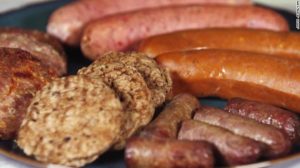
Anything out of a factory’s conveyor belt will also do you more harm than good so it if it comes in a package, stash it in a dark cabinet somewhere for later. The artificial colouring, preservatives, and synthesized flavours won’t do a running nose any good. You should avoid these foods even when you are not sick. First, most processed foods are loaded with sugar, wheat, and salt, which have negative implications. Second, while most processed foods have a list of ingredients, most of them are known to have other ingredients that are not reported.
Third, most processed foods are stripped of fiber, which is essential for your body. Fourth, while they have a list of ingredients, unless you have a background in chemistry, you can’t understand what they are.
Whether you are sick or healthy, you should do your best to avoid processed foods. In addition, you should do as much as you can to make and eat food at home instead of restaurants. Remember that these people are in this to make money and don’t have your health at heart. They want to make as much money as they can while at the same time increasing their margins.
Parting shot: Won’t I gain weight?
It’s a valid concern that with increased food intake, you are bound to be worried about putting on some weight. However, weight gain depends on calories rather than the type of food. Sometimes low or fat-free foods have loads of calories compared to high-fat alternatives, so keep that mind and do your homework first before outrightly terming any food as bad.
Like gas to a stove, food is the fuel that runs our physiological functions, one of those being battling diseases to keep us healthy. If you work your way around your menu with the dos and don’ts above guiding you all the way, you’ll be back to health in no time. We will suggest you to download our free sustainable fitness guide and watch our free masterclass to learn how to lose weight and sustain your results.
In addition, we recommend that you talk to a doctor, who will recommend the foods that you can eat and those that are not recommended. For example, if you have diabetes, it would be a bad thing to consume more sugar. If you have goiter, it would be a mistake for you to eat salty foods.
For support or questions contact us on support@xeniosfitness.com

Summary
What to Eat When You Are Sick
- Chicken soup (What to Eat When You Are Sick)
- Broth (What to Eat When You Are Sick)
- Garlic (What to Eat When You Are Sick)
- Coconut water (What to Eat When You Are Sick)
- Hot tea (What to Eat When You Are Sick)
- Honey (What to Eat When You Are Sick)
- Ginger (What to Eat When You Are Sick)
- Spicy foods (What to Eat When You Are Sick)
- Bananas (What to Eat When You Are Sick)
- Oatmeal (What to Eat When You Are Sick)
What Not to Eat When You’re Sick
- Refined sugar (What Not to Eat When You’re Sick)
- Alcohol (What Not to Eat When You’re Sick)
- Acidic foods (What Not to Eat When You’re Sick)
- Canned soup and saltines (What Not to Eat When You’re Sick)
- Junk food (What Not to Eat When You’re Sick)
- Toast (What Not to Eat When You’re Sick)
- Dairy (What Not to Eat When You’re Sick)
- Sports drinks (What Not to Eat When You’re Sick)
- Coffee (What Not to Eat When You’re Sick)
- Processed foods (What Not to Eat When You’re Sick)

